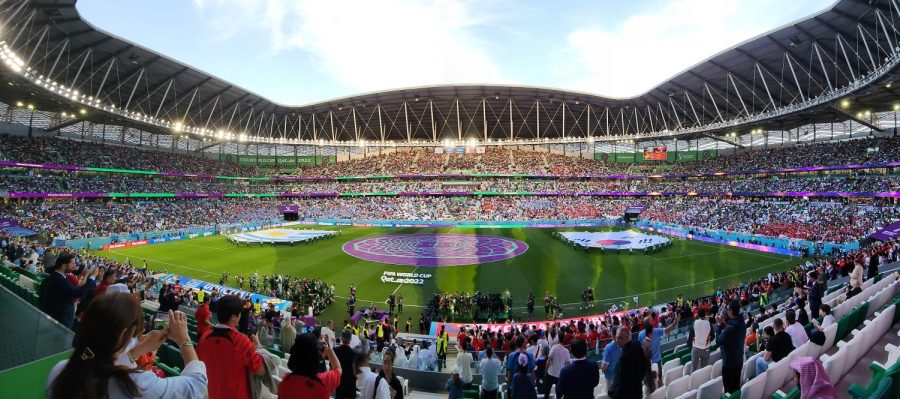Controversies of the 2022 World Cup
Global event meant to unite, instead divides
Flags of South Korea and Uruguay being displayed before the two nations faced off Nov.24. Photo credit; Heo Manjin: Republic of Korea Ministry of Culture, Sports and Tourism Official Photographer
December 6, 2022
The world’s biggest men’s international soccer tournament that only happens every four years has returned: the World Cup. The 32 best soccer playing nations in the world compete for the title of World Champion. First held in 1930 in Uruguay, the tournament has continued every four years (a break was taken between 1938 to 1950). Only seven countries have won the World Cup, with Brazil having won it a record of six times.
However, this World Cup has had several controversies, all beginning with the announcement that Qatar would be the host nation. The Department of Justice revealed that multiple FIFA officials had been bribed by Qatari officials to secure the rights to host the 2022 World Cup. Due to the lack of previous infrastructure, Qatar even had to go as far as building a new city–the city of Lusail. Ever since the announcement, there have been more scandals surrounding the World Cup, such as the exploitation and deaths of migrant workers, anti-LGBTQ+ laws, and revoking the right to consume alcohol only a few days before the kick off of the World Cup. There have also been controversies between other nations, like between the U.S. and Iran, and Germany protesting FIFA and Qatar.
As a result of the lack of infrastructure, and only 12 years to build everything, the Qatar government turned to a system in the middle east known as the “kafala” system. In this system, migrant workers came to Qatar under a visa supplied by the business that hired them. However, almost all migrant workers needed their bosses’ permission to end employment, move jobs, or leave the country.
The workers’ inability to control what they could do, along with a government that turned a blind eye, eventually led to extremely harsh working conditions. Workers were not given proper housing, were paid low wages, and were forced to work in the extreme Qatari heat. All of these culminated into the deaths of around 400 to 500 workers, according to an NBC report that quoted the Qatar World Cup Chief, Hassan Al-Thawadi.
Along with the mistreatment of the migrant workers, there has been more controversy with Qatar’s stance on LGBTQ+ rights. When Qatar was chosen as the host nation, there was fear that those individuals would not be allowed to attend the World Cup, or possibly be arrested in Qatar. This fear was due to the persecution of LGBTQ+ people in Qatar, and the laws which persecuted them. However, Qatari officials later said that they are open to all people and that people in the LGBTQ+ community are no exceptions.
The main controversy lies within the Qatar stadiums. Several reports have said that fans have been barred from entering the stadium if they have rainbow shirts or bucket hats. The fans are not the only people who have been punished for displays that support the LGBTQ+ community. Several of the national teams’ captains were set to wear a “OneLove” captain armband, however FIFA threatened each player who would wear the armband with a yellow card when the match started. Thus the teams backed out, claiming they didn’t want to see their players punished. This created more backlash with people as they were angry that the players were more worried of receiving a yellow card than protesting the anti-LGBTQ+ laws in Qatar.
In response, the German National Team posed in a photo before their match against Japan covering their mouths. Qatari fans responded by holding photos of former German player Mesut Ozil who faced racism and abuse from German fans after their early exit in the 2018 World Cup.
During the Portugal and Uruguay game on Nov. 28, a fan stormed the pitch waving a rainbow flag, and wearing a T-shirt that said “Save Ukraine” on the front while the back said “Respect for Iranian Women.” The fan ran out on the field for 32 seconds before being brought down by stadium security.
Iran has also been a center of discussion during this World Cup. Amid massive national protests in their country, in which hundreds have been arrested and several killed, the Iranian national team still competed. In their first game against England on Nov. 21, the Iranian players did not sing their national anthem in support of the protests back home, something which could get them arrested. In their second game against Wales on Nov. 25, the players were forced by the Iranian government to sing their national anthem, with threats against their family.
In an act of support for the Iranian protests, the U.S. social media accounts posted the Iranian flag without the Islamic Republic emblem which created anger within the Iranian government. Iran appealed to FIFA to get the U.S. Men’s National Team banned for 10 games, which would kick them out of the World Cup. In what could’ve been retaliation, Iranian reporters attended the U.S. men’s press conference where captain Tyler Adams and head coach Greg Berhalter fielded questions.
The Iranian reporters asked questions to Adams such as, “You say you support the Iranian people, but you’re pronouncing our country’s name wrong.” Adams in response apologized for pronouncing Iran incorrectly.
Another piece of controversy was between Qatar and Budweiser–who is the official beer sponsor of FIFA. In Qatar it is illegal to drink alcohol, so when Qatar was chosen to host the World Cup no one knew whether drinking would be allowed. FIFA and Qatar eventually came to an agreement that beer would be sold in special fan zones and inside the stadium. However, just a few days before the World Cup was set to take place, Qatar banned the selling of alcohol inside the stadiums which had already been shipped by Budwesier. So in response, Budweiser announced that all of the beer that they had to keep from when it was banned in stadiums will go to the winner of the World Cup.
Overall, the 2022 World Cup has seen its share of controversies, from Qatar’s mistreatment of migrant workers, to the laws against the LGBTQ+ community, and the restriction on drinking. There have also been controversies with other nations, with the political tensions between the U.S. and Iran spilling over into the World Cup, to Germany taking a stand against the Qatari laws.





















![Movie poster for '[Rec]" (2007).](https://www.lionnewspaper.com/wp-content/uploads/2023/04/rec-640x900.jpg)



